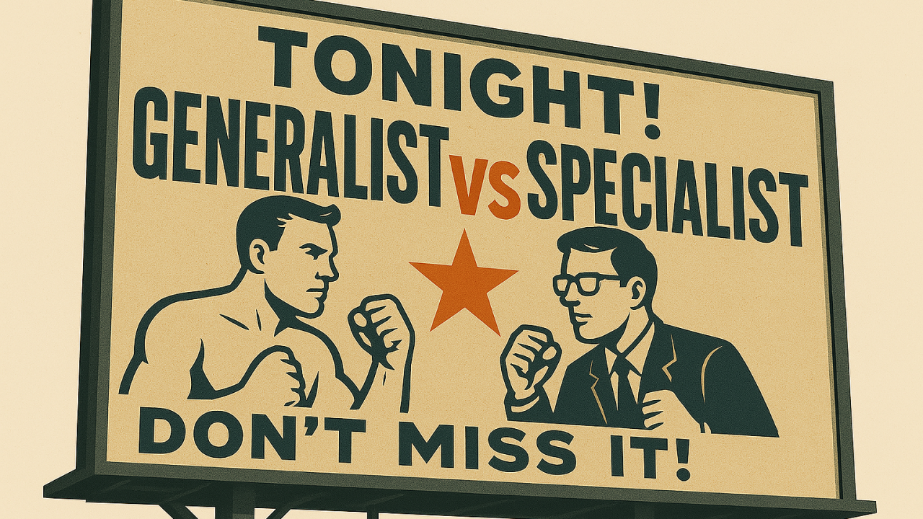
There’s this tug-of-war that’s been playing out forever. The generalists on one side, the specialists on the other. And depending on the day, the decade or the business trend of the month, one camp seems to get the upper hand. Generalists, with their fluid, wide-angle approach, often wear the badge of the problem solver. The Swiss Army knives of the knowledge world. You’ve heard it before: jack of all trades, master of none. Kind of a backhanded compliment, right?
Meanwhile, the specialists get rolled out when it’s time to go deep. Really deep. They’re the go-to when you’ve hit that wall no blog post or Stack Overflow thread can climb. When you need someone who speaks fluent quantum mechanics or can debug a broken neural net in their sleep. Their knowledge is like a submarine, narrow hatch, but it goes all the way down.
But now we’re heading into unfamiliar terrain. A world where artificial intelligence doesn’t just support us, it augments us. Where being good at many things isn’t a liability anymore, it’s a power-up. And where being too deep in one area might mean getting automated out unless you’re ten steps ahead of the machine.
Let me put it another way. I’m a generalist but a seasoned veteran from the browser wars. I have seen things you people wouldn’t believe. Netscape plugins on fire off the shoulder of AltaVista. I’ve had to explain to clients why the same button looked different in Firefox and IE6. Those moments shape you. They teach you how to adapt. Fast.
And that’s where the new categories come in.
We’re starting to see the rise of the ultra generalist. These are not just wide-angle thinkers. These are tech-savvy pilots of AI, code, strategy and everything in between. They’re the directors in a movie where the camera never stops moving. People who understand enough about algorithms, law, user experience and even a little psychology to stitch together ideas into something new. Think of them as the API between humanity and machine. They don’t need to write the whole script. They just need to know what to ask for and what to do with the answer.
Then, on the other side, we have the ultra specialists. The new sages. They’re not just experts. They’re the ones who can make sense of the gaps in the machine’s knowledge. Like artisans of old, but with doctorate-level depth and the kind of clarity that makes them almost mythical. Their work can’t just be Googled. It’s buried in context, in understanding, in nuances AI still struggles with. Some of them are so valuable, they operate like digital-age alchemists. Quiet, hidden, and vital. You won’t find them bragging on LinkedIn. You’ll find them behind the scenes, solving impossible problems.
And what’s fascinating is that these two types need each other. Desperately. The ultra generalist is the orchestrator, the navigator, the one who knows how to frame problems and loop in the right systems. But the ultra specialist is the one who makes the impossible part of the puzzle solvable. When the AI stutters, the specialist steps in. When the problem branches into three different disciplines, the generalist keeps the whole system from imploding.
You could say the old conundrum has been upgraded. The original generalist/specialist debate was about breadth vs. depth. This new one? It’s about integration vs. insight. About building the bridge vs. inventing the material it’s made from.
Here’s the twist. With AI co-piloting our workflows, the generalist’s breadth has been boosted. A generalist with a good AI is like a conductor who can also play a bit of every instrument. They don’t need to be a cello master, but they know what good cello sounds like. And now, with AI, they can compose symphonies using the right plugins. They know enough to prompt, curate and direct. That’s not being shallow. That’s being versatile in a way machines actually need.
And the ultra specialists? Their job isn’t getting easier. It’s getting weirder. More complex. Because now, their challenge isn’t just solving problems. It’s teaching the AI what they know. Turning experience into pattern. Making tacit knowledge explicit. Their craft is precious precisely because it’s the last mile AI can’t walk without help.
In many ways, we’re moving from a world of knowledge holders to knowledge translators. And generalists, augmented by AI, are natural translators. They see the forest and the trees. They’re less about knowing every answer and more about knowing which questions to ask, and who to bring into the room. Sometimes that room is physical. Sometimes it’s a Slack channel with three AI tools and one human domain expert on speed dial.
This shift will challenge old ideas about expertise. We’ll need new ways to assess value, because depth alone won’t always be enough. And versatility won’t either. What will matter most is whether you can interface with intelligence, human or otherwise. Whether you can bridge the gap.
It’s no longer about choosing a lane. It’s about building the highway system.
I once had a mentor who said, “In the future, you’ll either tell the machine what to do, or the machine will tell you what to do.” It sounded dramatic back then. Now, it’s just Tuesday.
So, to all the generalists who were told they lacked focus, and all the specialists who were told they lacked flexibility, here’s your moment. But it’s not a competition anymore. It’s a choreography. One group drives the dance, the other adds the impossible moves.
And me? I’m still somewhere in between. Watching it all unfold. Reminded that even the browser battles had something to teach us.
The difference is, now it’s less about who dominates, and more about who connects the dots. And those who can do that? They won’t just survive the future. They’ll design it.

 English | EN
English | EN 